

Gautthiod. Chomsky and the Universal Grammar. Noam Chomsky is well known on two fronts, as a philosopher and as a social thinker.
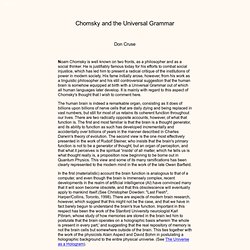
He is justifiably famous today for his efforts to combat social injustice, which has led him to present a radical critique of the institutions of power in modern society. His fame initially arose, however, from his work as a linguistic philosopher and his still controversial suggestion that the human brain is somehow equipped at birth with a Universal Grammar out of which all human languages later develop. It is mainly with regard to this aspect of Chomsky's thought that I wish to comment here. The human brain is indeed a remarkable organ, consisting as it does of billions upon billions of nerve cells that are daily dying and being replaced in vast numbers, but still for most of us retains its coherent function throughout our lives.
There are two radically opposite accounts, however, of what that function is. This all suggests that Rudolf Steiner's description of brain function may well be the true one. Rudolf Steiner: Encyclopedia II - Rudolf Steiner - Goethean scholar philosopher phenomenologist of spirit and sense perception. Steiner's father was a huntsman in the service of Count Hoyos in Geras, and later became a telegraph operator and stationmaster on the Southern Austrian Railway.
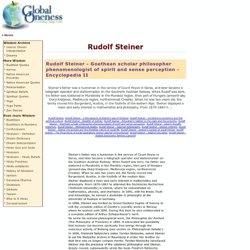
When Rudolf was born, his father was stationed in Murakirály in the Muraköz region, then part of Hungary (present-day Donji Kraljevec, Međimurje region, northernmost Croatia). When he was two years old, the family moved into Burgenland, Austria, in the foothills of the eastern Alps. Steiner displayed a keen and early interest in mathematics and philosophy. From 1879-1883 he attended the Technische Hochschule (Technical University) in Vienna, where he concentrated on mathematics, physics, and chemistry. Rudolf Steiner: Encyclopedia II - Rudolf Steiner - A few aspects of Steiner's way of thinking. According to Steiner, a real spiritual world exists out of which the material one gradually condensed, so to speak, and evolved.
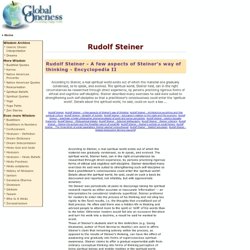
The spiritual world, Steiner held, can in the right circumstances be researched through direct experience, by persons practicing rigorous forms of ethical and cognitive self-discipline. Steiner described many exercises he said were suited to strengthening such self-discipline so that a practitioner's consciousness could enter the 'spiritual world'. Details about the spiritual world, he said, could on such a basis be discovered and reported, not infallibly, but with approximate accuracy.
Yet Steiner was periodically at pains to discourage taking his spiritual research reports as either accurate or inaccurate 'information' -- an interpretation he considered relatively superficial. Steiner preferred for readers to enter into the process of his thinking and not cling too rigidly to the fixed results, i.e. the thoughts that crystallized out of that process. Response to Critics :
Gordienko_info. This is a new publication in English of a critical examination of the work of S.
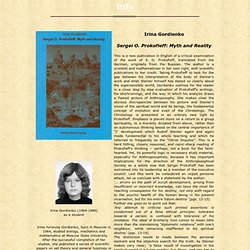
O. Prokofieff, translated from the German, originally from the Russian. The author is a scientist and mathematician in her own right, with scientific publications to her credit. Taking Prokofieff to task for the gap between his interpretation of the body of Steiner's work and what Steiner himself has stated so clearly about the supersensible world, Gordienko outlines for the reader in a close step by step evaluation of Prokofieff's writings, his shortcomings, and the way in which his analysis draws a flawed picture of Anthroposophy. She makes clear the obvious discrepancies between his picture and Steiner's vision of the spiritual world and its beings, the fundamental concept of evolution and even of the Christology. Further she goes on to point out that: The distinction needs to made between the personal element and the objective search for the truth.
Lochmann-Verlag, P. Antroposofi_officiell. The Nature Institute - Dogma and Doubt. Dogma and Doubt R.
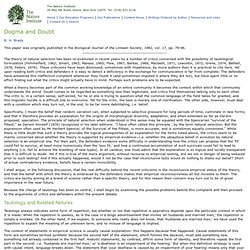
H. Brady This paper was originally published in the Biological Journal of the Linnean Society, 1982, vol. 17, pp. 79-96. Savitri by Sri Aurobindo. Angeloi.se. Mummel i kön. Gary Lachman. Guest essay: Work on What has been Spoiled. He accuses Steiner of contradicting his own ideals about the role of the modern teacher by exercising "occult" influence over his students-i.e. influence not addressed to their conscious "I".
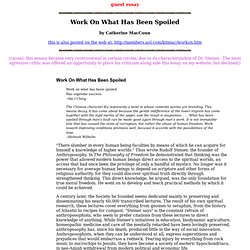
Overall, the tone is firm, bordering on harsh in certain passages, but respectful. He credits Steiner with instilling in him the very ideals that are motivating his action. Goesch states repeatedly that he attributes no evil intent to Steiner, only wishes that he would consider the effect his actions. Not until the second to last paragraph does he make direct mention of Alice Sprengel. Then, rather unfortunately, he attributes the entire letter to her influence. "The kind of interpersonal attitude you create not only contradicts your teachings; your behavior also contradicts what you yourself demand of spiritual teachers in the modern age. This passage is unfortunate in attributing harmful intent to Steiner, something Goesch had been at pains not to do throughout most of the letter. The Sacred Balance: Rediscovering Our Place in Nature by David Suzuki - Reviews, Discussion, Bookclubs, Lists.